Search Results for Tag: employment
Opening doors abroad
Portugal’s young people are going through difficult times. Youth unemployment in the country is at over 40 percent and many of those who do stay in Portugal end up in jobs that offer little career development. What makes things even tougher is that many Portuguese youth are traditionally reluctant to travel overseas to improve their job opportunities, or even just try something new.
Gonçalo Azevedo Silva is an exception. After spending a year abroad doing a GAP Year, he founded the organization GapYear.pt. The group aims to give Portuguese school leavers a perspective, by connecting them with foundations and charities who need people to volunteer overseas.
Listen to the report by André Leslie:
More on the Gap Year website (in Portuguese.)
Woman climbs Mount Everest to end poverty
Maria da Conceição became the first Portuguese woman to climb Mount Everest. She did it to raise money so that more Bangladeshis living in poverty would have the chance to find a job and feed their families.
In her job as flight attendant with Emirates Airlines, Maria da Conceição lived in a world of luxury – first class flights and five stars hotels. But that changed eight years ago during a stopover in Dhaka, where she was faced with a different reality.
In Bangladesh, she witnessed impoverished children living on the street, with little access to food and clothes, let alone education.
“I couldn’t ignore the poverty that I saw with my own eyes. It was impossible for me to go back to my daily routine as a flight attendant and ignore what I saw there,” she told DW.
As a result, Maria da Conceição launched the Dhaka Project, helping almost 600 children, by giving them access to education, health care, food, clothes and community aid.
For the former flight attendant, it was “unbelievable” that these children “didn’t have any kind of rights.” Maria said that they were “forgotten” and “ignored” in Dhaka’s streets. “It took a foreigner to come and help them. Now they have some rights,” she said.
The Dhaka Project was a non-profit organization, so Maria had to fight for donations. The majority of funding came from Dubai, in the United Arab Emirates, while there has also been some help from Portugal, Maria’s home country.
The Dhaka Project recognized with the European Union Women Innovators Prize and the Emirates Woman of The Year Award.
Resistance and crisis
Maria criticizes the government of Bangladesh for hindering her work. “I am not welcome in their country. They didn’t give me a visa,” said Maria. And, last year, they even accused her of human trafficking.
“Those were rough times. I fought against that accusation and I said that it wasn’t true and instead of accusing me they should accuse their own country. That put an end to it,” she remembered.
The global economic crisis has also affected the work of The Dhaka Project. Since money was tight, Maria da Conceição decided to restructure the project. Now, it’s known as the Maria Cristina Foundation, named after Maria da Conceição’s foster mother.
“Now, the main focus is on parents. But, whenever a child up to 18 years of age has the opportunity to gain a scholarship, we provide support for the process,” she said.
She also says that she made an agreement with the British Council that enables parents to learn English. That, in turn, makes it possible for them to work in Dubai. Maria helps out with her connections to her last employer, Emirates Airlines. She left that job when a British family decided to take on the costs of the foundation for a two-year period.
“When these people arrive in Dubai they don’t have anything. We help them to buy everything that they need. We take them to the hairdresser, to the dentist and we give them pocket money for food,” she said. “When they start working, the first month goes unpaid, so the foundation helps them to live comfortably during that period of time. Once they receive their first salary, we do what families do when their children have their first job: You have your own salary, so now you don’t need our help anymore.”
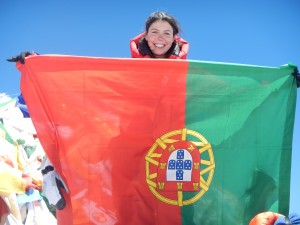
Hardly finished with her first major goal, Maria has already set another (Photo: Maria da Conceição)
Climbing to great heights
Before the global economic crisis, Maria was able to help almost 600 children, but now, because of her tight budget, she can only help one family at a time. Because of that, she was forced to think outside the box. Climbing Mount Everest was a way to get media attention again and raise enough money to continue her work.
She started to prepare for the expedition to Mount Everest a year ago. The training was hard, but she is determined to succeed. “It was a very intense month. I had to go to school in India to learn how to climb a mountain. In Dubai I did conditioning, I did cycling; I had to climb stairs wearing a suit weighing 29 kilograms for at least four hours a day. The training was designed to break me in, physically and mentally,” she said.
And she made it. Maria da Conceição became the first Portuguese woman to climb Mount Everest and now she expects to have the funding she needs to follow up on what she started eight years ago – and help break the chain of poverty in Bangladesh.
But Maria wants to do even more. In November, she will start the 7-7-7 challenge: seven marathons in seven continents in seven days, in order to finance her project. After all, as she told DW, the children and the parents are her family now and her way of life. And after Mount Everest, she’s in great shape.
Go to the Maria Cristina Foundation’s website.
Author: Daniel Pinto Lopes
Editor: Kate Müser
Young global leaders talk education
What will life be like in the year 2030? How can we help shape tomorrow’s world today? This is the question that Young Global Leaders from the world of politics, science, business and the arts are turning their attention to.
They are all under the age of 40 and all looking for solutions for the future. The “Young Global Leaders” initiative was set up by the founder and President of the World Economic Forum, Klaus Schwab. The five-part series looks at the issues of health, the environment, employment and the fight against poverty. In this episode, we meet three people who talk to us about their ideas on education: Subhash Dinar, senior vice-president of the international IT firm Infosys; Jimmy Whales, founder of Wikepedia; and Peter Bisanz, a film director from the US.
Watch this DW video to find out more:
Environmentally friendly engergy source gives students a job
Wood is the main source of energy in Cambodia, which has resulted in widespread deforestation. In response, French NGOs have developed an alternative – charbriquets made from coconut shells and dried organic waste. The fuel does not use chopped lumber – giving it a clear advantage. The briquets are inexpensive and burn longer than wood. Factory manager Carlo Figa Talamanca who took over the company from his former employers now wants to reach a wider market. He is working with a French aid group that turns students into a sales force. Talamanca is confident that his social enterprise SGFE (Sustainable Green Fuel Enterprise) will soon reach profitability.
From unemployed to entrepreneur: the making of young Arab leaders
Youth unemployment across the Arab world is at 33 per cent, and women are most likely to fit this category. However, some young leaders are trying to turn this around, by encouraging and educating those affected by unemployment and lack of opportunity in the Middle East and turning them into young entrepreneurs.
Watch this DW video to find out more about how young global leaders are creating opportunities for young Arabs in the Middle East.
South African neighborhood turns purple
Lavender Hill is one of the areas in Cape Town, South Africa with a serious gang problem and the highest unemployment rate. Subsequently, there are many cases of drug abuse and domestic violence. Marcelle van Zyl started a project in the area called Lavender in Lavender Hill. The idea is to keep the youth off the street and create employment opportunities by cultivating lavender and making soaps, teas and oils with the plant. The project started last year, but is lacking funds and therefore cannot employ more than five people at the moment. But Marcelle is working hard to keep the initiative going, as it is impacting positively on the community.
Listen to the report by Faatimah Hendricks:
For more on the Lavender Hill project, go to their Facebook page.



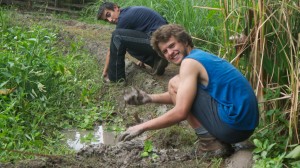

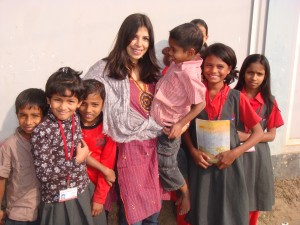
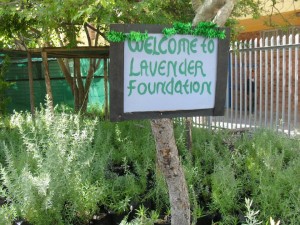
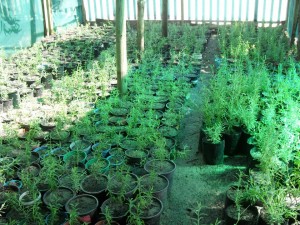
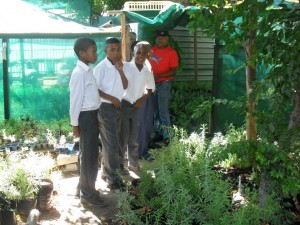
Feedback